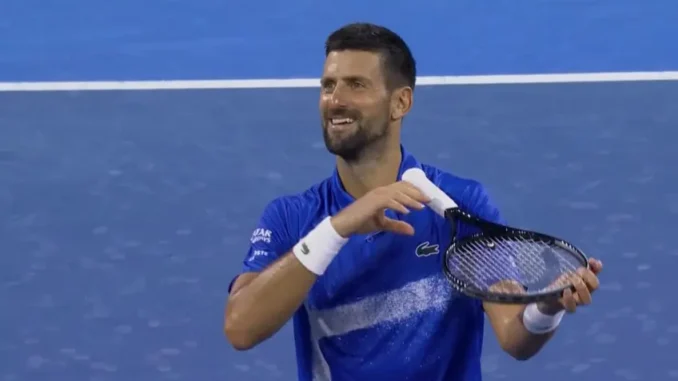
Novak Djokovic, one of the greatest players in tennis history, has achieved remarkable success in his career, but his journey has not been without its challenges. Among the many obstacles he has faced, Djokovic recently opened up about the biggest trauma he experienced in Australia—a chapter that left a deep and lasting impact on him both personally and professionally. While the Serbian superstar is celebrated for his resilience and determination on the court, his reflections on this difficult period reveal a more vulnerable side to the 24-time Grand Slam champion.
The traumatic episode Djokovic referred to occurred during the 2022 Australian Open, an event that saw him embroiled in a controversy that transcended sports. Despite being the reigning champion and a favorite to win the tournament, Djokovic found himself at the center of an international incident over his vaccination status amid the COVID-19 pandemic. The debacle resulted in his visa being canceled twice, his detention in an immigration facility, and ultimately, his deportation from Australia. This ordeal not only barred him from defending his title but also cast a shadow over his reputation.
Reflecting on the experience, Djokovic described it as one of the most challenging periods of his life. For an athlete accustomed to controlling his narrative through his performance on the court, being thrust into a global controversy was a jarring and deeply unsettling experience. The situation was further complicated by the intense media scrutiny and polarizing public opinions, which turned the incident into a flashpoint in debates about personal freedoms, public health, and government policies.
Djokovic’s deportation was a moment of profound humiliation and frustration for the Serbian star. He had arrived in Australia with hopes of adding another Grand Slam title to his illustrious career, only to find himself embroiled in legal battles and bureaucratic disputes. The situation took a toll not only on his mental well-being but also on his physical preparedness, as he spent days confined in an immigration facility with limited access to training and nutrition. For a player who meticulously prepares for each tournament, this disruption was particularly devastating.
The trauma of the Australian saga extended beyond Djokovic’s personal experience. The incident sparked a wave of criticism and support from fans, fellow players, and public figures, creating a highly charged atmosphere that was difficult to navigate. While some praised Djokovic for standing by his principles, others condemned him for what they perceived as a disregard for public health measures. The polarized reactions added another layer of complexity to an already painful situation, forcing Djokovic to confront questions about his values, choices, and the responsibilities of being a global sports icon.
In the months following his deportation, Djokovic faced additional challenges as he grappled with the fallout from the incident. His decision to remain unvaccinated meant he was unable to compete in several key tournaments, including the US Open. These absences not only affected his rankings and earnings but also disrupted his rhythm and momentum on the tour. Yet, despite these setbacks, Djokovic demonstrated remarkable resilience, using the experience as a source of motivation to prove his mettle and reaffirm his place at the top of the sport.
By 2023, Djokovic had made a triumphant return to Australia, winning the Australian Open and reclaiming his throne as the King of Melbourne Park. The victory was particularly sweet, as it marked his 10th title at the tournament and underscored his ability to overcome adversity. However, even as he celebrated this achievement, Djokovic acknowledged that the scars from his 2022 ordeal had not fully healed. The emotional weight of the experience remained with him, serving as a reminder of the complexities of navigating life as a global sports figure in an increasingly polarized world.
Djokovic’s reflections on his Australian trauma highlight the human side of a player often seen as invincible on the court. While his physical prowess and mental toughness have propelled him to record-breaking heights, the incident revealed his vulnerability and the challenges of balancing personal beliefs with professional obligations. For fans and observers, it offered a rare glimpse into the struggles faced by elite athletes, who are often expected to perform under immense pressure while navigating the complexities of public life.
The Australian saga also sparked broader discussions about the intersection of sports, politics, and personal freedoms. Djokovic’s experience became a case study in how athletes are increasingly being drawn into debates on societal issues, whether by choice or circumstance. For Djokovic, the incident underscored the importance of standing by his convictions, even in the face of overwhelming opposition. Yet, it also highlighted the need for greater understanding and empathy in addressing such polarizing issues.
Looking ahead, Djokovic remains focused on his goals, both on and off the court. As he continues to chase history and cement his legacy as one of the greatest players of all time, the lessons from his Australian trauma will undoubtedly shape his approach to the challenges that lie ahead. Whether through his performances, his advocacy, or his interactions with fans and fellow players, Djokovic is determined to turn the pain of the past into a source of strength and inspiration.
For Novak Djokovic, the trauma he experienced in Australia was a defining moment—one that tested his resolve, challenged his beliefs, and ultimately strengthened his character. As he moves forward, the Serbian star remains a testament to the power of resilience and the ability to overcome even the most daunting obstacles. While the scars of the past may never fully fade, they serve as a reminder of his journey and the unyielding spirit that has made him a legend in the world of tennis.
Leave a Reply